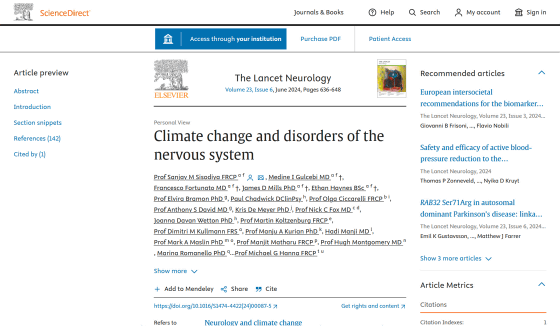Climate change will worsen diseases such as stroke, epilepsy, schizophrenia, and Alzheimer's

Climate change is known to have
Climate change and disorders of the nervous system - ScienceDirect
https://www.sciencedirect.com/science/article/abs/pii/S1474442224000875

Climate change likely to aggravate brain conditions | UCL News - UCL – University College London
https://www.ucl.ac.uk/news/2024/may/climate-change-likely-aggravate-brain-conditions
Climate change linked to worsening brain diseases – new study
https://theconversation.com/climate-change-is-linked-to-worsening-brain-diseases-new-study-225704
The human brain is thought to have about 86 billion nerve cells (neurons) , which are like a computer made up of electrically active components. Humans evolved in Africa, where temperatures are about 20 to 26 degrees Celsius and humidity is about 20 to 80%, and the human brain is designed to function comfortably in this environment. However, if extreme weather increases due to recent climate change, the brain may not function properly.
A research team from University College London in the UK reviewed 332 papers published between 1968 and 2023 to investigate the association between climate change and 19 different neurological disorders, including stroke, migraine, and Alzheimer's disease.
The results showed that climate change could worsen a variety of brain and nervous system disorders. 'Conditions that may be exacerbated by rising temperatures and humidity include stroke, migraine, meningitis, epilepsy, multiple sclerosis, schizophrenia, Alzheimer's disease, and Parkinson's disease,' the team said.

For example, heat waves can disrupt sleep, leading to sleep disorders that can worsen brain diseases such as
The researchers point out that some illnesses may prevent the body from sweating, which is essential for keeping cool, or from recognizing when it's too hot. Some medications used to treat neurological and psychiatric disorders can suppress sweating or disrupt the brain's thermoregulatory system, which could reduce a person's ability to cope with heat.
The research team's study showed that as temperatures rise, hospitalizations due to dementia increase, epilepsy seizures become more difficult to control, the risk of stroke and death increases, and mental illnesses such as schizophrenia tend to worsen. It has also been reported that about 20% of excess deaths in the 2003 heat wave in Europe were people with neurological disorders.

'Unless climate change is addressed as part of neurological care, the benefits of medical advances for the brain and neurological diseases may be offset by the worsening symptoms caused by climate change,' the team said. 'We should pay attention to the feeling that it's getting too hot to continue living the life we want and take action against climate change. Our lives depend on our brains, and climate change is damaging to them.'
Related Posts:
in Science, Posted by log1h_ik







